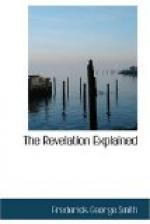6. And before the throne
there was a sea of glass like unto
crystal: and in the midst
of the throne, and round about the
throne, were four beasts full
of eyes before and behind.
7. And the first beast
was like a lion, and the second beast
like a calf, and the third
beast had a face as a man, and the
fourth beast was like a flying
eagle.
8. And the four beasts had each of them six wings about him; and they were full of eyes within: and they rest not day and night, saying, Holy, holy, holy, Lord God Almighty, which was, and is, and is to come.
9. And when those beasts
give glory and honor and thanks to him
that sat on the throne, who
liveth for ever and ever,
10. The four and twenty
elders fall down before him that sat on
the throne, and worship him
that liveth for ever and ever, and
cast their crowns before the
throne, saying,
11. Thou art worthy,
O Lord, to receive glory and honor and
power: for thou hast
created all things, and for thy pleasure
they are and were created.
It is probable that the Apocalypse was communicated to John in parts, or consisted of a series of symbolic visions. This is indicated by the expression “after this I looked,” and is also confirmed by the words following, “And immediately I was in the spirit,” implying that the vision recorded in chapter 1, which was given on the Lord’s day, had been interrupted and that a new one now began when the angel with trumpet voice gave summons for him to ascend to heaven “in the spirit” (or under the influence of the spirit of prophecy) to behold the events of the future, passing before him as a vast moving picture.
This fact of John’s ascension to heaven to behold certain visions of the future (which begin properly with chapter 6) will serve to explain many allusions to things said to occur in heaven, merely signifying that John was in heaven when these things were revealed to him, although their fulfilment was intimately connected with the affairs of the church on earth, for whose benefit the Revelation was given and unto whom it was sent.
When the apostle ascended through the door that had been opened unto him, the first object that met his vision and absorbed his soul was a throne with the Almighty seated upon it, around whom all the inhabitants of heaven were assembled. No symbol of God is given, for the reason that there is no analagous object that can be chosen as his representative. True, John saw a throne, but that is a symbol, not of God himself, but of his supreme power and authority. One was seated upon the throne separate from the throne itself. It is not said that a jasper or a sardine stone was seated thereon, for that would be to make such an object the representative of God; but he that sat on the throne “was to look upon” like a jasper or sardine stone. The jasper mentioned




